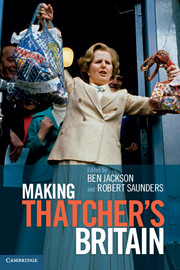Book contents
- Frontmatter
- Contents
- List of Contributors
- Acknowledgements
- Abbreviations
- Introduction Varieties of Thatcherism
- Part I Making Thatcherism
- 1 ‘Crisis? What crisis?’ Thatcherism and the seventies
- 2 The think-tank archipelago: Thatcherism and neo-liberalism
- 3 Thatcher, monetarism and the politics of inflation
- 4 Thatcherism, morality and religion
- 5 ‘A nation or no nation?’ Enoch Powell and Thatcherism
- Part II Thatcher’s Britain
- Part III Thatcherism and the wider world
- Appendices
- Notes
- Further reading
- Index
2 - The think-tank archipelago: Thatcherism and neo-liberalism
Published online by Cambridge University Press: 05 August 2012
- Frontmatter
- Contents
- List of Contributors
- Acknowledgements
- Abbreviations
- Introduction Varieties of Thatcherism
- Part I Making Thatcherism
- 1 ‘Crisis? What crisis?’ Thatcherism and the seventies
- 2 The think-tank archipelago: Thatcherism and neo-liberalism
- 3 Thatcher, monetarism and the politics of inflation
- 4 Thatcherism, morality and religion
- 5 ‘A nation or no nation?’ Enoch Powell and Thatcherism
- Part II Thatcher’s Britain
- Part III Thatcherism and the wider world
- Appendices
- Notes
- Further reading
- Index
Summary
In 1959, the Mont Pèlerin Society (MPS) met in Oxford, the first occasion on which the Society had held one of its regular conferences in Britain. Friedrich Hayek, Wilhelm Röpke, James Buchanan and other eminent figures gathered in Christ Church to debate, once again, the principles and practice of economic freedom. The Society had been founded by Hayek in 1947 as an international discussion group, composed of invited academics and a few select journalists and businesspeople. It devoted itself to the advancement of what would subsequently be dubbed ‘neo-liberalism’. The Oxford meeting covered familiar terrain for MPS veterans – employment policy, monopoly, the values of a free society – but it also included a session on a fresh topic – ‘Strategy and Tactics’ – which featured, among other contributions, a paper by Ralph Harris and Arthur Seldon.
Harris and Seldon were the two young men recently entrusted with running the new British free market ‘think-tank’, the Institute of Economic Affairs (IEA). Harris had been taught by the MPS member Stanley Dennison at Cambridge, had worked for the Conservative Party for a time, and before taking up his post at the IEA had been employed as a leader writer on the Glasgow Herald. Seldon had been involved in Liberal politics in the 1930s and 1940s, having been educated at the LSE, where, he said, ‘I was turned away from the Conservatives by Lionel Robbins who taught me that they were doing more damage than Labour in the 1930s by socialising in the name of capitalism.’ In their paper to the MPS, Harris and Seldon reflected on the obstacles to popularising free market ideas that they had encountered since beginning to work for the IEA. These obstacles, they argued, did not stem from public opinion, but ‘from the opposition of established interests to unavoidable and desirable change, from the preference of weak politicians for following short-sighted public opinion rather than leading and from the skill of anti-liberal intellectuals in developing their new mythologies’.
- Type
- Chapter
- Information
- Making Thatcher's Britain , pp. 43 - 61Publisher: Cambridge University PressPrint publication year: 2012
- 20
- Cited by

